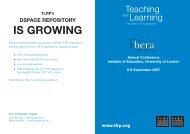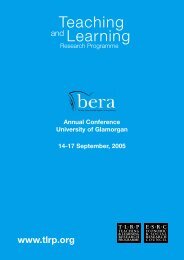Teachers - Teaching and Learning Research Programme
Teachers - Teaching and Learning Research Programme
Teachers - Teaching and Learning Research Programme
You also want an ePaper? Increase the reach of your titles
YUMPU automatically turns print PDFs into web optimized ePapers that Google loves.
10<br />
More interesting were the results on the other scale, personal involvement in research<br />
<strong>and</strong> its value for helping teachers to engage in <strong>and</strong> with research. Here there emerged<br />
significant differences (at the 1-% level) between different categories of teachers at<br />
primary level. Classroom teachers, in contrast to their principals, were more likely to<br />
seek personal involvement <strong>and</strong> valued educational research that helped them achieve this<br />
aim. No difference of this kind emerged from the analysis of the secondary sample.<br />
Indeed, overall, secondary teachers appeared less well disposed towards personal<br />
involvement in research than their primary colleagues (also significant at the 1-% level).<br />
Not surprisingly, given the gender imbalance between the two phases, female teachers<br />
were also more supportive of personal involvement in research.<br />
Four of the eighteen statements could not be fitted onto the two scales. There were<br />
significant differences in the value placed on research into teachers’ subject knowledge<br />
<strong>and</strong> in research which made it clear that findings had to be interpreted in the context of<br />
one’s teaching situation (i.e. the fitness for purpose). In both cases primary teachers rated<br />
these attributes more highly than secondary colleagues.<br />
Some lessons for future research<br />
There are also some lessons for the research community in these findings. The fact that<br />
so few respondents referred to recent studies may give some credence to Hargreaves’s<br />
(1997) criticisms that too much current research is either esoteric or irrelevant to<br />
teachers’ concerns. While part of the reason for this state of affairs has been the growth<br />
of ‘policy studies’, mainly concerned to identify the consequences of the application of a<br />
‘market forces’ approach to schools, it has also been a consequence of the need for all<br />
staff in University Departments of Education to do research as part of the HEFCE<br />
<strong>Research</strong> Assessment Exercise. Most of these new researchers were <strong>and</strong> are engaged in<br />
teacher training. <strong>Research</strong> on teaching the teachers has, therefore, exp<strong>and</strong>ed <strong>and</strong> of its<br />
very nature it is not likely to have a direct impact on those charged with teaching pupils.

















